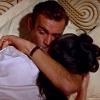Oh no, not a miscomparison, other than the situation. Le Chiffre looking through to Bond's soul and such is an observation that requires the kind of omniscience that we the viewer don't have in a film. We see both from the outside, and perhaps from a first-person POV, but we certainly can't discern their inner monologue, which is where much of the striking effect that Le Chiffre has on Bond takes place. We can see a shot of him glaring directly at the camera, but we may not see it quite as Fleming did (unless the director and DP are just absolute masters of their craft). Likewise, the effect of suspense in OHMSS required Bond's thinking (albeit more vocal, not an omniscient voice, and there, yes, I realize the miscomparisonLike the suspense of Fleming's OHMSS ski chase being based on Bond's inner monologue and perception, so too is Le Chiffre's menacing effect. Quite a few of these quotes are based upon how Bond sees him and sums him up... We can't be in Bond's head, only watch them glare at each other across the baize and try to interpret the mental conversation.
I think you are miscomparing both scenes. Much of the suspense in OHMSS depends on Bond mentally tabulating when his colleague will crack, and when Bond will be blown and sent for, and what conditions might be like once he makes his escape. That can't be rendered onscreen. Much of CR however consists of LeChiffre being silent and Bond having to try and "read" LeChiffre's expressions from his eyes. I think movies do this even better than books, because they can have us look from Bond's viewpoint. You can't be in Bond's head, but you can be in his eyeballs, and in the gambling scene that's what counts, because we're in Bond's position anyway--when LeChiffre glares at the camera he's glaring at us, and we're intrigued about reading his expression. LeChiffre's menacing effect probably would be even greater onscreen, because the combination of silence and being directly stared at is even greater when conducted through image and sound, rather than mere words. So no, I very much disagree.
Well, that's of course a subjective opinion, though not completely unfounded. We may never know if GF would have been better had they found a good actor that fit the literary description more closely (somehow!I think these however are clearly subsidiary to the verbal interaction between Bond and Goldfinger, who's one of the first villains Bond really goes to town with in verbal sparring. Gert Frobe was such an odd looking phyiscal specimen that he probably was even better for the role than what Fleming had in his head. Frobe has that instant-photograph look in his eyes, and he's wonderful when he looks shifty or perturbed.There were many instances in the book of GF's eyes "looking past his eyes, through to the back of Bond's skull." Much unspoken conversation between he and Bond, and much to be said by his non-verbal actions and glares.
I felt that the talking was less essential in sizing them up (though Bond was well into his method of quickly verbally provoking his nemeses) and more essential in explaining GF's motivation. For his development, it was indeed fundamental. But it was Bond's observation (which we can only hope to match, it's not guaranteed) when Goldfinger had stopped speaking and looked at him that there was no negotiation with this man. There wasn't so much of this in the film, because much of that happened when Bond was GF's employee (an angle that I missed, but that's really OT and neither here nor there).Goldfinger and Bond don't have the single-duel and torture relationship that counted in CR. They keep meeting multiple times and getting to know each other better. Having a relationship based on silence and eye contact would not have worked for them. It's important that they talk to size each other up.
If he can sell it, yes. In a long, complex film like CR, he needs boosts to keep the threat close to the forefront of our minds, lest we feel nothing when it finally happens. Perhaps it would have been just as effective to make him all strong and such up until the very end, then make him a weak mess when about to be killed, but as SNF pointed out, the character was more three-dimensional in the film.Le Chiffre also had to be more outwardly scared and determined to get his money so that the non-Flemingo audience could grasp the situation.
I think this is a little unfair to the audience. Once told LeChiffre's motivation, I think they can keep it in mind.
Semis popping wheelies, driving on their sides, the character of Professor Joe, the choice of Wayne Newton to play him, a fictional country, giving Q a load of field time, the winking fish...all these elements can thank the Moore era for their inclusion. Don't get me wrong, I'm not against ALL of them, but without the era of camp, they'd be out like tapered jeans (which are now curiously back in...). The Dalton films were fantastic IMO, but were unfortunately hampered down by the Moore camp. The producers weren't as bold in making their changes as they were with CR, and as a result, the spirit of Fleming comes out much more clearly, IMHO.I certainly think LTK is right up there with CR in terms of Fleming's spirit, but it's critically hampered down by remnants of the Moore-era aesthetic, and so one has to see though more haze to realize the Fleming feel.
That's the first time I've heard LTK accused of carrying Moore-era aesthetics (TLD usually gets that criticism). I think the charge that it carries too much Miami Vice aesthetics is more valid, though I dispute that one too.



